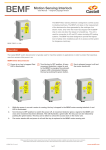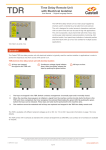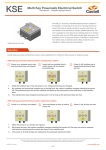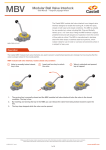Download KSSE Multi Key Solenoid Controlled Switch
Transcript
KSSE Multi Key Solenoid Controlled Switch User Manual - Original Language Version The KSSE is a solenoid controlled, multi-key electrical switch for the controlled isolation of low current. This product is used where the controlled isolation of a machine needs to take place, i.e. where a robot has to finish a cycle prior to isolation and where multiple entry points to the protected area are required. The solenoid is continuously rated, and its position is electrically monitored. This type of isolator should be used for short term, off load isolation. The unit is supplied capable of being mounted into an existing panel or for surface mounting within its own IP65 rated lockable steel enclosure. The KSSE is manufactured from either brass or stainless steel making it ideal for use in standard or harsh corrosive environments. E20-FSS-3D-F-C/O4-110A Operation Castell multi key solenoid controlled switches are typically used for machine isolation in applications where a machine has to finish a cycle prior to isolation. KSSE multi key solenoid controlled switch, exchange key condition 1 Isolation Key is free while power is on, solenoid is de-energised. Personnel keys are trapped. 2 Insert and turn isolation key to switch power off. Once external signal is received (LED illuminates), push the button to energize the solenoid and release personnel keys. 3 Power is off, isolation key is trapped and personnel keys are free. 1. While the isolation key is free, the power is on. Personnel keys are trapped. 2. By inserting and turning the isolation key in the KSSE, the contact condition changes switching the power off. Once the machine has finished the cycle, a signal is sent to the KSSE illuminating an LED. Pushing the button energises the solenoid. The personnel keys can now be released by pushing the button. These keys can be taken by personnel to unlock the doors in the machine area. 3. The Isolation Keys stay trapped ensuring power is off until all personnel keys are replaced in the KSSE unit. While every effort has been made to ensure the accuracy of the information provided, no liability can be taken for any errors or omission. Castell Safety International Limited reserves the right to alter specifications and introduce improvements without prior notice. www.castell.com U-KSSE-001-E Issue 1 1 of 7 KSSE Multi Key Solenoid Controlled Switch User Manual - Original Language Version Operation KSSE multi key solenoid controlled switch, double key condition 1 All keys are trapped while power is on, solenoid is de-energised. 2 Wait for an external signal (sent to the unit upon machine cycle is completed). Once signal is received, an LED illuminates. Push the button to energize the solenoid and release the keys. This changes the switch contacts condition. 3 While all keys are free, the power supply is interrupted. 1. While all keys are trapped, the switch for the main power supply is closed enabling the power supply. 2. Once the machine has finished the cycle, a signal is sent to the KSSE to energise the solenoid. This illuminates the LED. The keys can now be released by pushing the button. This changes the switch contacts condition, interrupting the power supply. The released keys should be taken by the personnel to unlock the doors in the machine area. 3. The power is off until all keys are replaced in the KSSE unit and turned, switching the contact condition to open. While every effort has been made to ensure the accuracy of the information provided, no liability can be taken for any errors or omission. Castell Safety International Limited reserves the right to alter specifications and introduce improvements without prior notice. www.castell.com U-KSSE-001-E Issue 1 2 of 7 KSSE Multi Key Solenoid Controlled Switch User Manual - Original Language Version Usage The KSSE multi key solenoid controlled switch is designed to be part of a safety system and is used to isolate the power releasing a key which is then used to gain access to a hazardous area via an access interlock such as the AI, AIE or Salus. The KSSE multi key solenoid controlled switch is not designed for security purposes. No hazardous substances were used in the manufacture of this product. The product can be disposed of in standard waste. Installation Back of panel units should be mounted to a flat surface using suitable fasteners. Please refer to drawing on page 5 for more details). The lock face should be sealed to the panel for ingress protection. Cables should be connected to the switch in accordance with the applicable wiring diagrams. Ensure that the unit is bonded for earth continuity (see drawing on page 5 for more installation details). IMPORTANT: The interlock should be mounted using anti-tamper fasteners to prevent unauthorised removal. The KSSE range of multi key solenoid controlled switches must be installed by a competent and qualified person who has read and understood these instructions. Please retain this document in your technical file. Maintenance Periodic visual checks should be carried out by the site manager / safety officer. Do not lubricate lock barrel with oil or grease, use CK Dry Powder Graphite if necessary. In case of defects beeing detected please contact your nearest Castell Support Department for further actions. Please see Contact section for contact details. While every effort has been made to ensure the accuracy of the information provided, no liability can be taken for any errors or omission. Castell Safety International Limited reserves the right to alter specifications and introduce improvements without prior notice. www.castell.com U-KSSE-001-E Issue 1 3 of 7 KSSE Multi Key Solenoid Controlled Switch User Manual - Original Language Version Technical Data Temperature rating -25°C ice free to +55°C Type of mounting Surface (with enclosure) or panel mount using suitable fasteners (please refer to drawing on page 4 for more details) Weight 4 kg (2 lock portions unit) Material Brass/Stainless steel Power isolation 20A Switch approvals BS,UL,CSA & VDE MTTF Certification Available on request Application A typical application of KSSE multi key solenoid controleld switch is machine guarding. It is usually used in combination with an access interlock such as the Salus for part body access or an AIE access interlock with an exchange key for full body access control. The KSS breaks the machine safety circuit, ensuring a machine is shut down once the isolation key is inserted and turned into the unit. Once the machine has completed the cycle, an external signal is received by the solenoid, which is indicated by an illuminated LED. Activating the green button on the KSSE will enable the personnel keys to be turned and removed ensuring the power is locked out. The keys can then be taken to the AIE double key access interlocks to enable access to the machine. The machine cannot be restarted until all doors are closed, and all personnel keys returned to the KSSE multi key solenoid controlled switch. KSSE Solenoid Controleld Switch EC-Declaration AIE Access Interlocks We, the manufacturers, declare that the components, detailed herein and placed on the market, comply with all the essential health and safety requirements applying to them. Empowered signatory: Mr T.C. Whelan Managing Director While every effort has been made to ensure the accuracy of the information provided, no liability can be taken for any errors or omission. Castell Safety International Limited reserves the right to alter specifications and introduce improvements without prior notice. www.castell.com U-KSSE-001-E Issue 1 4 of 7 KSSE Multi Key Solenoid Controlled Switch User Manual - Original Language Version Drawing Dimensions: Note: For safe mounting, use security screws in mm KSSE While every effort has been made to ensure the accuracy of the information provided, no liability can be taken for any errors or omission. Castell Safety International Limited reserves the right to alter specifications and introduce improvements without prior notice. www.castell.com U-KSSE-001-E Issue 1 5 of 7 KSSE Multi Key Solenoid Controlled Switch User Manual - Original Language Version Wiring Diagram KSSE, Wiring Diagram DC KSSE, Wiring Diagram AC While every effort has been made to ensure the accuracy of the information provided, no liability can be taken for any errors or omission. Castell Safety International Limited reserves the right to alter specifications and introduce improvements without prior notice. www.castell.com U-KSSE-001-E Issue 1 6 of 7 KSSE Multi Key Solenoid Controlled Switch User Manual - Original Language Version Wiring Order Diagram Information Product Type Part Number E Example E A1 11 1 2 3 4 - 20 - 5 - - FS B Isolation Key Symbol (exchange key condition) or - 6 1 D B1 12 - 7 8 - F - 9 10 110 A - CC 4 - Personnel Key Symbol (exchange key condition) or Primary Key Symbol (double key condition) Secondary Key Symbol (double key condition 1 Isolation 20 amps (standard) 2 Lock portion type FS (1) / Q (1) 3 Material B = Brass / S = Stainless steel 4 Secondary (additional) lock portion(s) 1 / 2 / 3 / 4 / 5 or 6 secondary lock portions 5 Key condition E = Exchange key condition / D = Double key condition (simulataneous removal of all keys) 6 Mounting P = Panel mount (back of board) / F = Front of board mount, with enclosure 7 Contacts arrangement in normal position CO = NO/NC arrangement (contacts closed/opened)/ CC = NC arrangement (contacts closed) 8 Number of contacts 4 / 6 (standard) 9 Control voltage 110 / 24 / 240 (standard) 10 Current VAC / VDC 11 Lock portion symbol: Isolation key (for exchange key condition) Primary key (for double key condition) FS (1) up to 3 characters / Q (1) up to 6 characters 12 Lock portion symbol: Personnel key (for exchange key condition) Secondary key(s) (for double key condition) FS (1) up to 3 characters / Q (1) up to 6 characters (1) FS - Lock type Q - Lock type Up to 3 characters Up to 6 characters Special construction available upon enquiry Contact Information Castell Safety International Ltd. The Castell Building 217 Kingsbury Road London, England NW9 9PQ Castell Safety International Ltd. Oskar-Jäger-Strasse 137 50825 Köln Germany Castell Interlocks Inc. Suite 800 150 N Michigan Avenue, Chicago, Illinois 60601 USA Castell Safety China Building 1, No. 123, Lane 1165, Jindu Road, Minhang District, Shanghai 201108, China. t: +44 (0) 20 8200 1200 f: +44 (0) 20 8905 9378 e: [email protected] t: +49 (0) 221 1694 794 f: +49 (0) 221 1694 795 e: [email protected] t: +1.312.360.1516 f: +1.312.268.5174 e: [email protected] t: +86 21 61519023 f: +86 21 61519030 e: [email protected] While every effort has been made to ensure the accuracy of the information provided, no liability can be taken for any errors or omission. Castell Safety International Limited reserves the right to alter specifications and introduce improvements without prior notice. www.castell.com U-KSSE-001-E Issue 1 7 of 7











